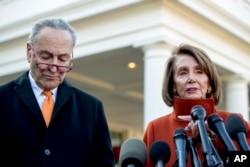The U.S. government is all but assured to remain partially closed into the new year as neither house of Congress plans to conduct any business for the remainder of 2018.
With a lapse in federal funding nearing the one-week mark, a standoff remains between President Donald Trump, who is demanding Congress approve billions of dollars for wall construction along the U.S.-Mexico border, and Democratic lawmakers, who back a modest increase in overall border security funding but resolutely oppose a wall.
On Thursday, the House and Senate gaveled in for sessions lasting only minutes, with no mention of the work stoppage or any possible resolution. Both are scheduled to hold pro forma sessions with no business conducted Dec. 31.
Tweeting earlier in the day, Trump asserted that "Border Patrol Agents want the wall" and touted a "Need to stop Drugs, Human Trafficking, Gang Members & Criminals from coming into our country."
When asked Wednesday how long he thinks the shutdown will last, Trump told reporters, "Whatever it takes."
He declined to comment on whether he might back away from the $5 billion wall funding demand.
'Chaos'
Democrats, meanwhile, blamed Trump for "plunging the country into chaos" and noted that, weeks ago, Trump said he would be "proud" to "own" a shutdown over border wall funding.
In a joint statement, Senate Minority Leader Chuck Schumer of New York and presumed incoming House Speaker Nancy Pelosi of California said, "The president wanted the shutdown, but seems not to know how to get himself out of it."
Any formula to fully fund the U.S. government will have to be approved by both houses of Congress and signed by Trump. Many lawmakers went home this week for the Christmas holiday and have no plans to return before early January.
Last week, the Senate unanimously approved a spending bill with no funds set aside to build a wall. The House declined to vote on it, instead passing its own spending bill with the wall funding Trump seeks. That bill is a non-starter for Senate Democrats, who can block such legislation.
Shift in House
Republicans currently control both houses of Congress and the White House, but in one week, Democrats will take over in the House while Republicans will add two seats to their current Senate advantage.
Once sworn in next week, the new House Democratic majority will be able to pass any spending bill it chooses. It remains to be seen, however, how Senate Republicans will react to a House bill that lacks wall funding.
The shutdown is affecting about 800,000 federal workers. About half of them are still going to work while the rest are furloughed. None will be paid until the shutdown is over.
In his morning prayer, Senate Chaplain Barry Black appeared to reference the funding standoff and request divine intervention.
"Stay close to our lawmakers," the chaplain said. "Deliver them from the mire of division and despair as you lead them to your desired destination."






